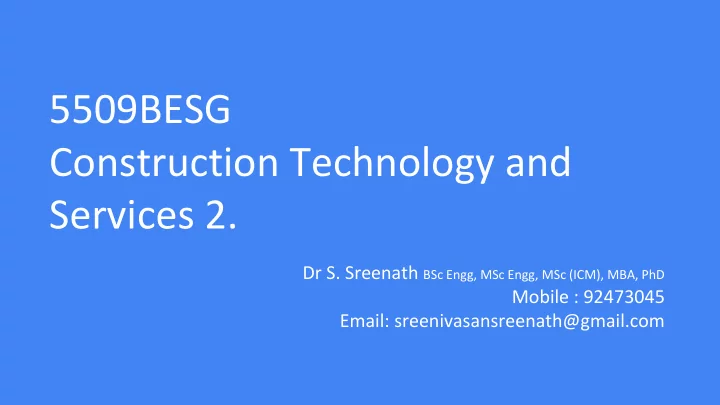

5509BESG Construction Technology and Services 2. Dr S. Sreenath BSc Engg, MSc Engg, MSc (ICM), MBA, PhD Mobile : 92473045 Email: sreenivasansreenath@gmail.com
Outline Syllabus 1. Demolition 10. Building and Fire 2. Site problems 11. Service Integration 3. Substructure 12. Sustainable and Intelligent 4. Basements Buildings 5. Structural Frames 13. Refurbishment Technologies 6. Floors 14. Building Services 7. External walls 15. Health and Safety 8. Roofs 9. Internal Access
Learning Outcomes 1. Analyse and illustrate the various forms of superstructure construction for low and high rise building structural frames. 2. Describe and evaluate the various forms of foundations and substructure work for multi-storey buildings. 3. Explain the typical remedial works to multi-storey buildings during refurbishment and adaptation work. 4. Analyse the importance of sustainability in the context of the design and construction of multi storey buildings. 5. Evaluate modern methods of construction and new renewable energy technologies in relation to industrial and commercial buildings. 6. Describe the range of Heating, Ventilating and Air Conditioning systems for industrial and commercial buildings. 7. Describe the installation and integration of utility services to multi-storey buildings.
Learning Outcomes of Assessments The assessment item list is assessed via the learning outcomes listed: REPORT (Assignment) 1 2 Test #1 6 7 Assignment in lieu of Test #2 3 4 5
Assessment Details Category Weightage Exam duration Assignment 1 & 2 30% Test MCT – 20 Q 20% 45 min Assignment # 3 50%
DEMOLITION
Outline 1. Intoduction 2. Low Rise Building 3. High Rise Building 4. Controlled Demolition
Introduction Demolition is the tearing-down of buildings and other structures. Low rise buildings is by pulling down either manually or mechanically using hydraulic equipment, elevated platforms, cranes and excavators. High rise buildings are demolished using controlled explosives or by hydraulic breakers.
Demolition Permit approvals Safety document submissions, approvals and briefing. Method statement submission Removing hazardous or regulated Protection works materials. Existing utilities termination Sequence of demolition based on technical considerations. Notifications
Hydraulic excavators are used to topple Demolition of one- or two-story buildings by an Low Rise Building undermining process. The strategy is to undermine the building while controlling the manner and direction in which it falls. The demolition project manager/supervisor will determine where undermining is necessary so that a building is pulled in the desired manner and direction. Walls are typically undermined at a building's base.
High reach demolition excavators are more often used Demolition of for tall buildings where explosive demolition is not High Rise Building appropriate or possible. Excavators with shear attachments are typically used to dismantle steel structural elements. Hydraulic hammers are often used for concrete structures and concrete processing attachments are used to crush concrete to a manageable size, and to remove reinforcing steel. The "inside-out " method is used, whereby remotely operated mini-excavators demolish the building from the inside, whilst maintaining the outer walls of the building as a scaffolding, as each floor is demolished.
Controlled Large buildings, tall chimneys, bridges, and Demolition of increasingly some smaller structures may be High Rise Building destroyed by building implosion using explosives. Imploding a structure is very fast — the collapse itself only takes seconds — and an expert can ensure that the structure falls into its own footprint, so as not to damage neighboring structures.
Case Study #1 Victoria Theatre
Construction Programme Contract Commencement date : 12 Oct 10 Contract Completion date : 11 Oct 11 Contract duration : 12 months Bored piles : 109 Nos Secant bored piles : 481 Nos VT & VCH
Overall Site Plan VT & VCH
Demolition Stages VT & VCH
Demolition Stage A VT & VCH
Demolition Stage A
Shoring plan Life cycle costing of asset
Shoring Sections VT & VCH
Piling Sequence Stages VT & VCH
VT & VCH
Equipments used BROKK remote control hydraulic Torch cutter crusher/breaker 3ton lifting chain block Diamond Wall Saw Cutting Machine Hand Tools Diamond Coring Machine Personal Protection Equipments Hydraulic excavator/breaker Lifting Apparatus Skid Loader Wire Ropes 3 ton forklift Pallet trucks Electrical drilling machines Mist machine Electric Grinder Bubble form spay machine
Mist Machine To resolve the problem of dust generated during hacking/crushing works especially within structures.
Bubble Foam Machine For effective dust suppression By combining air, surfactant, and minimal water into a highly efficient foam chamber, foam is generated and discharged through chute nozzles.
https://www.youtube.com/watch?v=SaBQ3 AkRetI
Thanks!
Recommend
More recommend